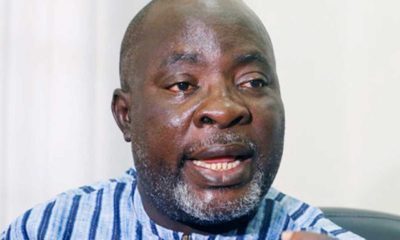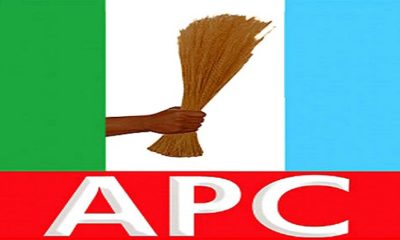Politics
Why Buhari Malami Umar Should Resign – Nwabueze

Eniola Olayemi
Elder statesman and constitutional lawyer, Professor Ben Nwabueze (SAN) has joined Nigerians condemning President Muhammadu Buhari suspension of the Chief Justice of Nigeria (CJN), Walter Onnoghen.
According to him, Buhari’s suspension of the CJN “is in itself, a most condemnable subversion of the constitution” adding that his statement while announcing it to the public “makes the action so absurdly subversive.”
He therefore called for the resignation of President Muhammadu Buhari, Attorney General of the Federation and Justice Minister, Abubakar Malami (SAN); and the chairman of the Code of Conduct Tribunal (CCT), Justice Danladi Umar for allegedly subverting the constitution.
Nwabueze argued that the CCT chairman cannot order the suspension or vacation from office of a public officer until after trial, hence “the CCT acted ultra vires the Constitution in making the order directing the President to suspend the CJN from office.”
Buhari had in justifying why he suspended Onnoghen and appointed Justice Tanko Muhammad as acting CJN, said he acted with the CCT’s ex-parte order. He added “in line with this administration’s avowed respect for the Rule of Law, I have wholeheartedly obeyed the Order of the Code of Conduct Tribunal dated 23rd January 2019.”
But Nwabueze said in a statement on Thursday, “The ‘administration’s avowed respect for the Rule of Law’ and for obedience of court orders sound like a deliberate perversion of truth, as witness Dasuki’s continued detention four years after a court of law ordered his release on bail, and same as Ibrahim Yaquob El Zakzaky two years after he was granted bail.
“The President’s statement raises several questions, the most crucial of which is as to whether the CCT has the power to order or direct the President to suspend the CJN. Second, whether the President, incarnating the Nigerian state, and as guardian of its Constitution, is bound to carry out the order, even when he knows, as he ought to know, that he has no power to suspend the CJN. Third, do the circumstances in which the order of the CCT was obtained not suggest a pre-meditated plan to subvert the Constitution?
“With respect to the first question above, the suspension is manifestly subversive of paragraph 18 of the Fifth Schedule to the Constitution (1999), which provides as follows: 18. (1) Where the Code of Conduct Tribunal finds a public officer guilty of contravention of any of the provisions of this Code it shall impose upon that officer any of the punishments specified under sub-paragraph (2) of this paragraph and such other punishment as may be prescribed by the National Assembly. (2) The punishment which the Code of Conduct Tribunal may impose shall include any of the following – (a) vacation of office or seat in any legislative house, as the case may be. (b) disqualification from membership of a legislative house and from the holding of any public office for a period not exceeding ten years; and (c) seizure and forfeiture to the State of any property acquired in abuse or corruption of office. (4) Where the Code of Conduct Tribunal gives a decision as to whether or not a person is guilty of a contravention of any of the provisions of this Code an appeal shall lie as of right from such decision or from any punishment imposed on such person to the Court of Appeal at the instance of any party to the proceedings.
”It is clear from paragraph 18 that: only the CCT itself can order vacation of or suspension from office; the President is not empowered to do so, and cannot be ordered or directed by the CCT to do so; more importantly, the CCT cannot make an order vacating an office or suspending a person from office until the trial before it is completed and the accused person is found ‘guilty of contravention of any of the provisions of this Code’; the trial in this case is only just commencing; the right of appeal to the Court of Appeal conferred by paragraph 18(4) of the Fifth Schedule is from a decision of the CCT finding the accused person guilty of contravention of the Code, not from the action of the President suspending the accused person from office even when the action (suspension) is on the direction of the CCT; the denial of that right is a violation of the Constitution.
”In conclusion, the CCT acted ultra vires the Constitution in making the order directing the President to suspend the CJN from office. The suspension is unconstitutional, null and void. The second question raised above, though not as crucial, is remarkable for its great intricacy. The impression created by his statement is that the President is trying to hide under the cover of the principle that an order of court directing him to do something imposes upon him a duty to carry out the order, notwithstanding that he does not have the power to do the thing in question, and that we are thereby precluded from enquiring as to whether or not he in fact has the necessary power. The ex parte order the President obtained from the CCT directing him to suspend the CJN from office does not, and cannot, erase the fact that he lacks the power to do that. The New Webster Dictionary of the English Language defines ‘suspend’ to mean “to remove temporarily from an office, to cause to cease for a time from operation or effect.
”This sad episode in our history would not be completely resolved by the resignation of Justice Onnoghen, as is being suggested in some quarters, unless the President, as the person who brought this whole mess upon us, also resigns. The Attorney-General of the Federation (AGF), Abubakar Malami (SAN), and Justice Danladi Umar must also resign.”




























